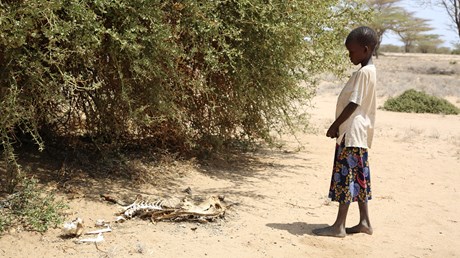The plight of herding communities facing hunger echoes Old Testament examples.

“I am the father and mother of my children,” said Regina, sitting on the ground of the straw hut she built herself and weaving a basket.
The family’s possessions hang on the wall: a plastic blue bowl, a pair of small sandals, a green bottle cap. A toddler plays behind Regina’s back. A baby squirms in her lap. It is midafternoon in Nakorio village in northeastern Kenya, and nobody has eaten today.
Last year, Regina’s husband left for Lake Turkana. Other men have also abandoned their families—some desperate to save their herds of camels and other livestock; some ashamed of coming home to their starving children.
“I don’t even miss him because he doesn’t bring any food for me,” she said. “If he returned, I would chase him away.”
The Turkana, a semi-nomadic people in Kenya, share a plight with millions of East Africans, starving and displaced as a result of the worst drought in at least four decades. The ongoing threat of famine and food shortage in sub-Saharan Africa has become, to outsiders, a global suffering cliché.
But for Christians, the crisis in the dusty East African terrain should offer a jolt of recognition. Famine appears as a recurring character across the lives of Abraham, Isaac, and Jacob—a force that not only incites physical hardship but also brings degradation on their families, a pattern echoed in families like Regina’s.
“The stories of Genesis were not told to teach about famine,” said Yohannes Sahile, an Old Testament theologian at School of Theology at Africa International University, in Nairobi. “But we can find lessons about how to respond to famine even though such lessons were not the main objectives.” ...
from Christianity Today Magazine
Umn ministry


.gif)

.gif)
.gif)
